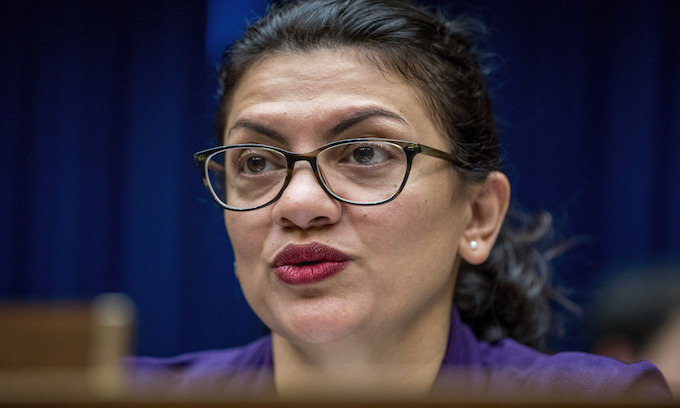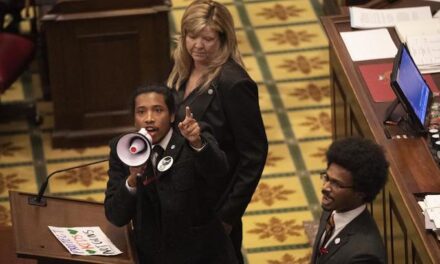HIGHLAND PARK — U.S. Rep. Rashida Tlaib on Tuesday joined with environmental justice groups to push for the congressional passage of the THRIVE Act to protect the climate and create millions of “green” jobs in urban areas.
The proposed legislation, which backers say would create 15 million jobs across the country, was touted at Parker Village, a community solar project that advocates say is providing economic cost savings into this impoverished area.
“You talk about community led empowerment, this is it. What they’re trying to do is become much more independent especially with such a high concentration of poverty to be able to create our own energy, our own resources,” said Tlaib, D-Detroit.
“When I see the high rates of high rates of utility shutoffs, water shutoff because poverty’s increasing and also the cost of living … this is the kind of projects that help communities like mine and especially Highland Park.”
Tlaib represents the 13th Congressional District, which includes Highland Park.
Analysts have noted the legislation requires the federal government to spend $1 trillion a year on green energy and infrastructure, as well as creating union jobs. The spending would be guided by a 20-member board with representation from labor groups, impacted communities and indigenous communities.
But the $10 trillion Thrive Act faces an uncertain future in the House and Senate, which the Democrats narrowly control, because of its price tag, which is more expensive than President Joe Biden’s $2 billion infrastructure plan over 10 years.
The operators of Parker Village, which was once an shuttered school building in the heart of a neighborhood, has been seeking green technology and renewable energy. Everything there, said owner Juan Shannon, from electric vehicle charging stations to street lights, a solar pergola and a future cafe, will be powered by solar.
Shannon said his project is about building a “smart neighborhood that is based in renewable energy, technology, media and agriculture” which is set up to help people “live better, healthier lives.”
“Different fossil fuels create different ailments,” Shannon said. “And so having a project that is run with renewables, it’s like a list of things that it helps. If you get an oil spill, people and animals die. If you get a solar spill, it’s just a bright, sunshiny day.”
The Transform, Heal and Renew by Investing in a Vibrant Economy Act is an effort pushed by racial justice and environmental groups and some Democrats in Congress to pass legislation to promote clean energy and slice climate pollution in half by 2030. The proposal was introduced last month and U.S. Rep. Debbie Dingell, D-Dearborn, is a co-sponsor.
Shannon said the act if passed, it would not only infuse cash into his operation as a community resources center but train people in new jobs and provide clean energy in the community that barely has working street lights.
“It would give lower prices and less pollution,” he said. “This would jump-start a lot of upward mobility and the middle class and wages.”
Shimekia Nichols, who belongs to the racial environmental activist group called Soulardarity, said the THRIVE Act would be a boon to a neighborhood like hers and help to “close the digital divide that’s happening,” especially with urban school children.
She pointed out that street lights had been out for years, but solar lights “give us some say so in terms of what we can do to begin to save energy and make a better impression on the earth.”
___
(c)2021 The Detroit News
Visit The Detroit News at www.detnews.com
Distributed by Tribune Content Agency, LLC.
—-
This content is published through a licensing agreement with Acquire Media using its NewsEdge technology.



















Hey Rashida, I live in Michigan. How is solar power going to work in Michigan in the fall, winter and early spring when it is cloudy out and the sun is very low on the horizon? California has way more sunshine than Michigan has and they suffered severe power shortages, with their “clean energy” in the summer, when the sun was out and it was over 100 degrees out. No power for air conditioning, no power for cooking, no power for refrigerators, no power for lights. What Rashida and the bureaucrats in Washington will do, is enrich their relatives and friends using trillions in taxpayer money and we the people will suffer because of electrical shortages.
ALso, as we saw in Texas, when it gets REAL COLD those wind farms won’t BE ABLE TO DO JACK< as they are frozen up!!
It’s the things people do that is causing climate change. We have far too many people in the country. It will get worse under the piece in the WH.
“When I see the high rates of high rates of utility shutoffs, water shutoff because poverty’s increasing and also the cost of living “
And this is all caused by the dishonorable, dishonest, corrupt Democrat Party’s overspending money that they don’t have.
Like a hooker with a stolen credit card.
This is what caused the Housing collapse in 2006. TOO MANY FOLK being given loans/mortgages for stuff they COULDN’T pay back.. SAME APPLIES TO utilities..
NO PAY, No play!
Rashida—go away, please.
i would like to push her back arab land.
You’re not the only one.
Yeah, great place for all-solar site with 183 sunny days per year and 33 inches of snow covering soar panels, and make our grandchildren pay for this small token?
They talk about community lead empowerment, these are outsiders ith an agenda pushing it on the communities. Most community residents are never consulted until the elected officials offer a program that has had no local imput asked for or given. There will be one or two progressives to put on the show for the media but average citizen will receive no benefit in the end.
AND Note, the “JOBS” they are looking to create are UNION JOBS.. of course, since practically EVERY DAMN UNION OUT there, supports the commucrats.
Ituser, I’m guessing those who don’t wish to be union are out of luck in being able to find work in renewable energy. I live in a right to work state, where not all jobs are union, and these democrats are basically telling me, being non union, (I’m retired anyway), that I would not be able to assemble solar panels? Give me a break! Panels are being assembled in China and you can bet your bottom dollar those workers don’t belong to a union. I agree with you by the way.
Maybe you should find a different state to live in…
She is an IDIOT.
SHE Is evil incarnate.. NOT an idiot.
Let’s translate Tlaib’s statement. This is going to be a slush fund for Democrat states and Democrat Party donors. This money is going to be used to increase the re-election chances of Democrat politicians.
If solar is capable of paying for itself doesn’t it stand to reason that it should be able to pay for the things Tlaib wants?
As i’ve often thought. IF a company can’t survive on its OWN TWO feet, and needs govt subsidies, IT SHOULD BE LEFT TO DIE OFF.